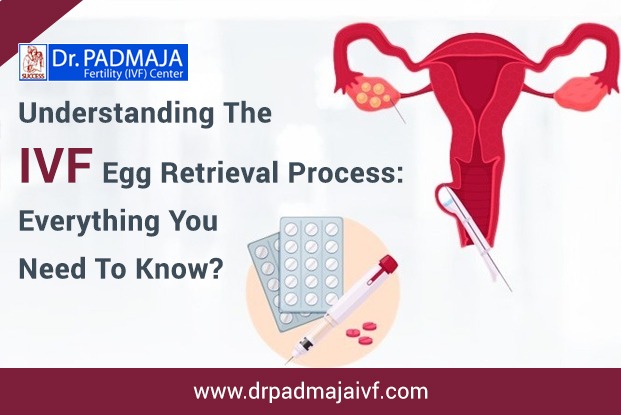For many couples struggling with infertility, IVF (In Vitro Fertilization) offers a ray of hope. One of the most crucial steps in the IVF journey is egg retrieval—a delicate procedure that plays a pivotal role in the success of fertility treatments. If you are considering IVF and want to understand what happens during egg retrieval, this comprehensive guide will walk you through everything you need to know. Whether you’re seeking the best fertility centre in Hyderabad or looking for expert infertility doctors in Hyderabad, this article is your go-to resource.
What is IVF Egg Retrieval?
Egg retrieval, also known as oocyte retrieval, is a minimally invasive surgical procedure performed to collect mature eggs from a woman’s ovaries. These eggs are later fertilized in a lab to create embryos, which are then transferred to the uterus. The success of an IVF cycle largely depends on the quality and quantity of eggs retrieved, which is why it’s essential to undergo the procedure at a reputed fertility hospital with advanced technologies and skilled specialists.
The IVF Egg Retrieval Process Step-by-Step
1. Ovarian Stimulation
Before egg retrieval, the ovaries are stimulated using fertility medications. This step ensures the development of multiple eggs instead of the usual one egg per cycle. Clinics like Dr Padmaja IVF Center in Hyderabad are known for their personalized stimulation protocols that optimize egg production while minimizing side effects.
2. Monitoring and Trigger Shot
Throughout the stimulation phase, the patient undergoes regular ultrasound scans and blood tests to monitor the growth of follicles (fluid-filled sacs containing eggs). A “trigger shot” of hCG or GnRH agonist is given to mature the eggs once the follicles are the appropriate size. Timing is crucial here, and the procedure is typically scheduled 34-36 hours after the trigger shot.
3. The Egg Retrieval Procedure
Egg retrieval involves the use of sedation or moderate anesthetic. Using ultrasound guidance, a thin needle is inserted through the vaginal wall into the ovaries to aspirate the eggs. The process usually takes 20-30 minutes. Since it’s a delicate procedure, choosing a top-rated ivf centre with a skilled embryology team is vital to maximize success.
4. Recovery After Egg Retrieval
After surgery, patients are observed for a few hours. Mild cramping, bloating, or spotting is common but usually subsides within a day or two. The following procedures are involved: fertilization, embryo culture, and embryo transfer.
How Many Eggs Are Retrieved?
Age, ovarian reserve, and sensitivity to stimulation are some of the variables that can affect the quantity of eggs that are recovered. On average, 8-15 eggs may be collected. However, quality matters more than quantity. Clinics such as Dr Padmaja Fertility Center in Hyderabad focus on individualized treatment plans to optimize egg quality for better IVF success rates in Hyderabad.
Is Egg Retrieval Painful?
The majority of women feel very little discomfort during egg retrieval because to contemporary anesthetic procedures. Post-procedure cramping or bloating is common but manageable with rest and mild pain relievers. The process will go as smoothly and comfortably as possible if you choose the best fertility center.
Risks Associated with Egg Retrieval
While generally safe, egg retrieval, like any medical procedure, carries minor risks, including:
Ovarian hyperstimulation syndrome (OHSS)
Infection or bleeding
Rare damage to surrounding organs
Undergoing IVF at trusted fertility treatment centers in Hyderabad with experienced doctors significantly reduces these risks.
Cost of IVF Egg Retrieval in Hyderabad
One of the most frequently asked questions is regarding the IVF cost in Hyderabad. The cost of egg retrieval is typically included in the overall IVF package, which may vary depending on the clinic, protocols used, and whether advanced techniques like ICSI in Hyderabad are required. Transparent pricing is a hallmark of reputed clinics like DrPadmaja IVF Center, ensuring patients know what to expect financially.
Role of Advanced Techniques like ICSI
For cases involving male infertility factors or previous fertilization failures, Intracytoplasmic Sperm Injection (ICSI Hyderabad) is often recommended. In this technique, a single sperm is injected directly into the egg to enhance fertilization chances. Combining IVF with ICSI has significantly improved success rates for many couples.
Choosing the Best IVF Center in Hyderabad
Selecting the right clinic can make a world of difference in your IVF journey. Look for ivf centers in Hyderabad that offer:
Experienced infertility specialists
State-of-the-art lab facilities
High success rates
Transparent communication and patient support
DrPadmaja Infertility Doctors have earned a strong reputation for their expertise, compassion, and personalized care, making them one of the best IVF centers in Hyderabad.
Alternatives if IVF Egg Retrieval Fails
In cases where egg retrieval yields fewer or no viable eggs, doctors might suggest:
Adjusting stimulation protocols in future cycles
Using donor eggs
Exploring alternatives like IUI centres in Hyderabad for less invasive options
At infertility centres in Hyderabad, including DrPadmaja Fertility Center, comprehensive counseling is provided to help couples explore all possible treatment paths.
Conclusion
Understanding the IVF egg retrieval process helps reduce anxiety and prepares you for a significant step in your fertility treatment. From initial ovarian stimulation to the retrieval of eggs, every phase requires expert care and precision. Partnering with the best fertility centre in Hyderabad ensures that you receive top-notch care, enhancing your chances of achieving a successful pregnancy.
If you’re ready to take the next step, consult with experienced infertility doctors in Hyderabad at a reputed fertility hospital who can guide you through a customized treatment plan. Remember, choosing a clinic with high IVF success rates in Hyderabad and a compassionate team can make your IVF journey smoother and more successful.
About the Author

This blog is penned by a devoted content specialist passionate about raising awareness around fertility treatments and emotional well- being. With in- depth disquisition on motifs like IVF and fertility, the thing is to give precious perceptivity for couples on their trip to parenthood.
Frequently Asked Questions (FAQs)
- What is egg retrieval in IVF?
Egg retrieval, also known as oocyte retrieval, is a minor surgical procedure where mature eggs are collected from a woman’s ovaries after ovarian stimulation for use in IVF treatment.
- Is egg retrieval painful?
Egg retrieval is performed under sedation or anesthesia, so you won’t feel pain during the procedure. Some women experience mild cramping, bloating, or discomfort afterward, similar to menstrual cramps.
- How long does the egg retrieval procedure take?
The actual retrieval process typically takes about 20-30 minutes, depending on the number of follicles.
- How many eggs are typically retrieved?
The number varies from person to person. On average, 10-15 eggs may be retrieved, but this depends on factors like age, ovarian reserve, and response to stimulation medication.
- What happens after egg retrieval?
After retrieval, the eggs are evaluated in the lab. Mature eggs are fertilized with sperm via conventional IVF or ICSI. Embryos are monitored for development before being transferred to the uterus or frozen for future use.
- Is there any downtime after egg retrieval?
Most women can resume normal activities within a day or two. However, it’s recommended to avoid strenuous activities for a few days to allow recovery.
- Are there risks associated with egg retrieval?
Egg retrieval is a safe procedure, but minor risks include bleeding, infection, or ovarian hyperstimulation syndrome (OHSS). Your doctor will monitor and minimize these risks.

